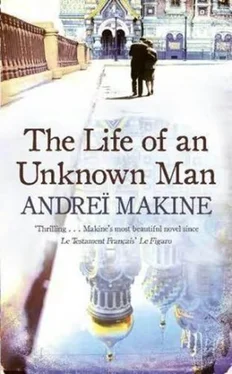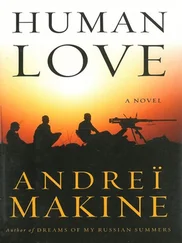Andreï Makine - The Life of an Unknown Man
Здесь есть возможность читать онлайн «Andreï Makine - The Life of an Unknown Man» весь текст электронной книги совершенно бесплатно (целиком полную версию без сокращений). В некоторых случаях можно слушать аудио, скачать через торрент в формате fb2 и присутствует краткое содержание. Жанр: Современная проза, на английском языке. Описание произведения, (предисловие) а так же отзывы посетителей доступны на портале библиотеки ЛибКат.
- Название:The Life of an Unknown Man
- Автор:
- Жанр:
- Год:неизвестен
- ISBN:нет данных
- Рейтинг книги:3 / 5. Голосов: 1
-
Избранное:Добавить в избранное
- Отзывы:
-
Ваша оценка:
- 60
- 1
- 2
- 3
- 4
- 5
The Life of an Unknown Man: краткое содержание, описание и аннотация
Предлагаем к чтению аннотацию, описание, краткое содержание или предисловие (зависит от того, что написал сам автор книги «The Life of an Unknown Man»). Если вы не нашли необходимую информацию о книге — напишите в комментариях, мы постараемся отыскать её.
The Life of an Unknown Man — читать онлайн бесплатно полную книгу (весь текст) целиком
Ниже представлен текст книги, разбитый по страницам. Система сохранения места последней прочитанной страницы, позволяет с удобством читать онлайн бесплатно книгу «The Life of an Unknown Man», без необходимости каждый раз заново искать на чём Вы остановились. Поставьте закладку, и сможете в любой момент перейти на страницу, на которой закончили чтение.
Интервал:
Закладка:
They understood that death had ceased to surprise, it occurred too frequently in this city in extremis. Many were the apartments inhabited by corpses, dead bodies were deposited in the public streets, only a slender frontier separating them from the living. Volsky remembered a passerby stopping at the entrance to Palace Bridge one day, beside a man stretched out in the snow, who suddenly collapsed himself, joining the man on the far side of that frontier. “I almost did that just now,” he thought, glancing at the old man’s body.
Death had always been cordoned off in his mind by a complex game of hide-and-seek with himself, in which he veered between perfumed promises, cynicism, and fear. He had come across the same contrivances in books: a maze of prevarications for keeping quiet about death, if not dressing it up in lies…
The woman reached out her hand, adjusted the candle. The flame made her emaciated hand transparent, the pattern of the blood vessels was clear. Fingers of ice. The shadow of her gesture passed over the old man’s face like a caress and seemed to animate it with a trace of life. She must have noticed this, smiled as she closed her husband’s eyes and squeezed his hand.
All that Volsky had known about death now seemed false. This moment he shared with these two ancient beings was vibrant with life. A life clarified in the ultimate simplicity of truth. These old hands joined, this grieving smile on the woman’s face, the calm of her gaze.
Late in the night she put a little canvas bag on the bedside table and, more rapidly than his eyes, Volsky’s sense of smell detected dry bread. “We’re going to be able to eat,” the woman whispered, as if she were afraid of disturbing her husband’s sleep, and she added, “Thanks to him…” Words whose meaning Volsky could not follow. The dry bread swelled deliciously in the mouth. And with it this taste his tongue had difficulty in recognizing, a lump of sugar that dissolved slowly, becoming not a taste but a vision, the shifting mosaic of a forgotten world. “We shouldn’t eat too much,” they both remarked automatically. The well-known refrain of all starving people facing the danger of sudden abundance. Too much… Volsky looked at the little bag, calculated the time his neighbor might be able to hold on with this reserve supply.
“Yes, thanks to him,” she repeated. A letter left by her husband had told her about the existence of this bag hidden behind those books that had not yet been burned in the stove. For weeks now the man had been saving a part of his ration, knowing that between himself and his wife a choice had to be made as to who should survive…
Volsky had already heard tell of such people in Leningrad in the siege who let themselves die to save a loved one, generally a mother sacrificing herself for her children. Now he himself owed his life to a man.
The old woman fell silent, shut her eyes, her hand clasping her husband’s fingers. Volsky once more had the feeling that the bond between them was indifferent to the demise of bodies. The woman took a deep breath and, with the wry smile that was familiar to him, murmured, “As a matter of fact, I did the same…” With a nod of her head toward a little set of shelves, she indicated a paper package from which she extracted slices of dried bread.
He set off for the cemetery in the dense black of a winter morning. Shadowy main thoroughfares, empty of traffic, were evocative of frozen fjords from which the sea had withdrawn. There were more passersby than he would have expected. They stood out against the darkness, as if on a photographic negative. The ones going to the factory walked faster and looked less downcast, Volsky noticed, not knowing whether this impression of energy was due to the extra bread they received or to their robust constitutions. More frequently than these workmen, women passed by, drawing sleds laden with buckets, some empty, some filled with water from the Neva. Their gait did not differ from the shuffling of people who, like Volsky, were transporting a dead person.
He had used a wardrobe door, a plank a couple of feet wide, to support the old man’s body. Rare were those who managed to find a coffin. Most people buried their loved ones in a shroud made from a curtain or a tablecloth.
After three or four crossroads you no longer had to turn into different streets to get to the cemetery and from now on everyone was moving in the same direction. Volsky waded through the snow a short distance behind two women whose burden had been placed on a rectangle of sheet metal. They came to a corner and stopped, one of them embraced the other before leaving her. She had helped her for part of the way and now had to go off to work, thought Volsky. The one who was left in her harness advanced more slowly now and soon he was on the point of overtaking her. It was then that he noticed his mistake. What he had taken for sheet metal was, in reality, a large painting… Amazing and yet not so, he told himself, picturing the disarray, the haste, the impossibility of quickly finding a sled… The figure swathed in cloth and lying at the center of the frame did not appear to be heavy, the canvas sagged very little. But to slide such a rectangle along called for strenuous efforts: the corners of the picture caught in the snow, the body slithered around, risked falling off…
More with a gesture than with words, Volsky offered his help, the woman accepted with a simple nod of her head. With one hand he was now pulling her load. The black of the sky turned to violet, limpid, icy. The fine line of the street, the white filaments of breath above the walkers, could be seen more clearly.
The sound of aircraft arose while they were crossing a large empty square. “The worst kind,” Volsky said to himself, hearing the screams of the Stuka dive-bombers. They could feel the blast from the explosions in the soles of their feet and the din reverberated through the scenery of the dead city. A huge cloud arose from the next street, swirling around itself. The people abandoned their dead and rushed into the entrance halls to apartment buildings. Volsky and the woman he was helping found themselves lying against a wall, behind snowdrifts. She was stretched out on her side, her arms shielding her face. Without knowing anything about her, unaware of whether she was young or old, Volsky felt intense pity for this body flung down amid the dirty snow. Just one fragment of shrapnel and this unknown woman could be left there, an inert piece of human debris. He had an impulse to stand up, to interpose himself between this life and the spurts of metal riddling the street.
After a quarter of an hour they resumed their journey and Volsky could finally see the face of the woman walking beside him. She was young, but her hunger-ravaged features made her ageless, almost without personality. Like all the women in the besieged city. Eyes enlarged and sunken, emaciated cheek lines that allowed the geometry of the jaws and the skull to show through.
When they stopped, breathless, to crunch some dried bread, he spoke, wanting to lighten the weight of their funereal progress.
“I’d never have expected to be giving my neighbor a ride on a contraption like this. It’s sad… And yours isn’t much better provided for… Who is that?”
“It’s my mother.”
They remained still, facing one another, silent, avoiding the slightest facial expression, resisting the onset of tears. It was minus fifty degrees that morning, it was not the moment to weep.
The young woman came to life first, bent down, seized the rope attached to her load.
“I’ve changed more than you, Georgy,” she murmured. “You don’t recognize me.”
Volsky thought he had misheard, amazed by the way she addressed him but also by the speed at which this woman’s voice was once more becoming familiar. Yet he was still looking at a stranger.
Читать дальшеИнтервал:
Закладка:
Похожие книги на «The Life of an Unknown Man»
Представляем Вашему вниманию похожие книги на «The Life of an Unknown Man» списком для выбора. Мы отобрали схожую по названию и смыслу литературу в надежде предоставить читателям больше вариантов отыскать новые, интересные, ещё непрочитанные произведения.
Обсуждение, отзывы о книге «The Life of an Unknown Man» и просто собственные мнения читателей. Оставьте ваши комментарии, напишите, что Вы думаете о произведении, его смысле или главных героях. Укажите что конкретно понравилось, а что нет, и почему Вы так считаете.









